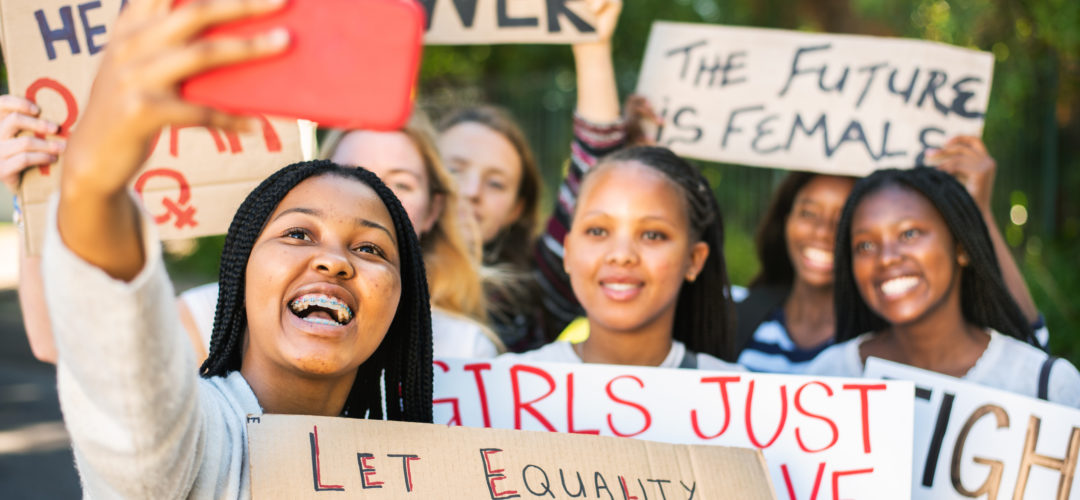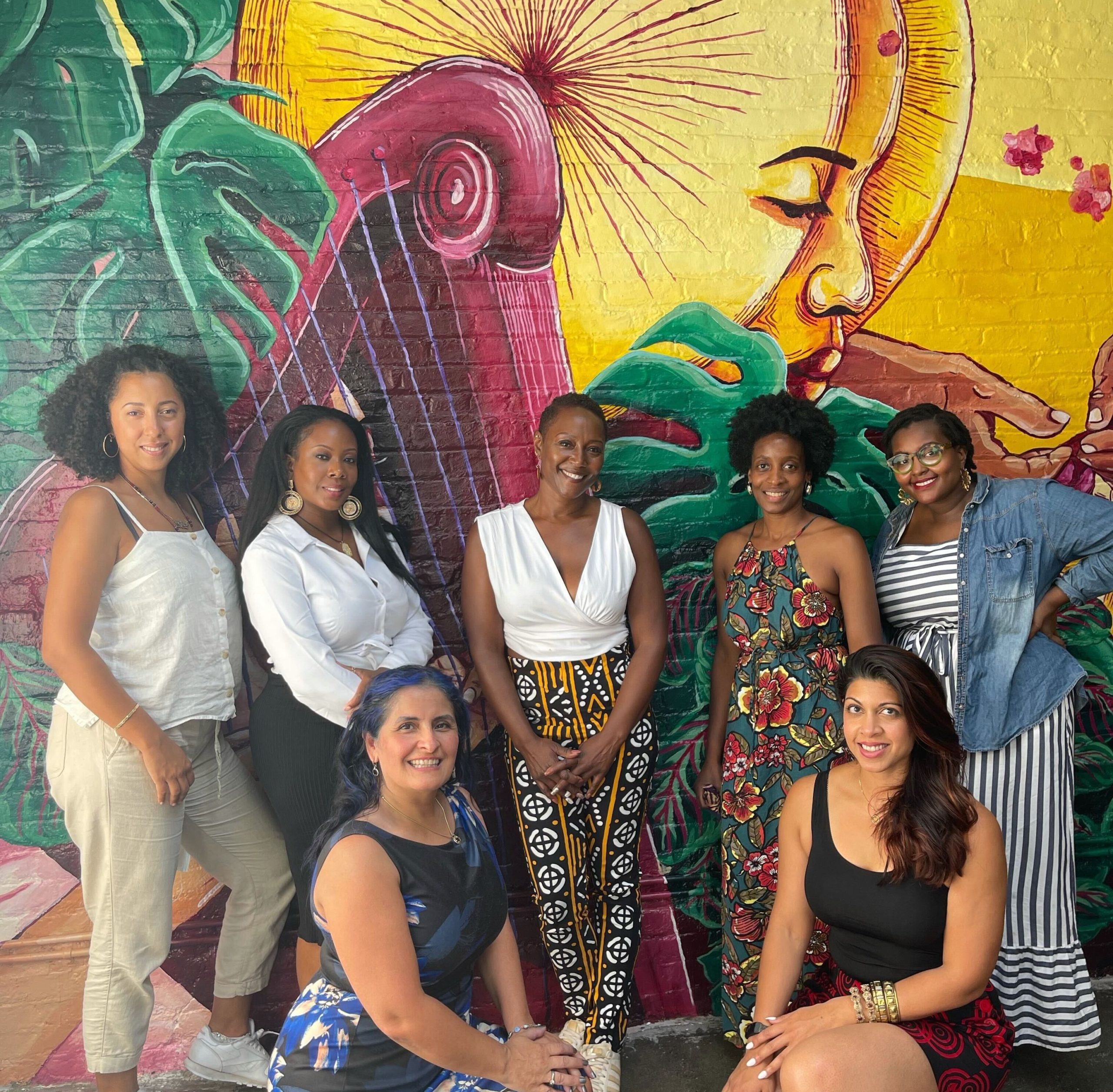Grantmakers for Girls of Color’s Call for the Philanthropy Sector
March 24, 2022
 Grantmakers for Girls of Color (G4GC) strives to create a philanthropic home for girls, femmes, and gender-expansive youth of color, many of whom have been traditionally excluded from the philanthropy sector. A sponsored project of Rockefeller Philanthropy Advisors, G4GC was first founded as an online platform and funder network but has since grown into an expansive grantmaking organization.
Grantmakers for Girls of Color (G4GC) strives to create a philanthropic home for girls, femmes, and gender-expansive youth of color, many of whom have been traditionally excluded from the philanthropy sector. A sponsored project of Rockefeller Philanthropy Advisors, G4GC was first founded as an online platform and funder network but has since grown into an expansive grantmaking organization.
Maheen Kaleem is vice president of operations and programs at G4GC and has previously served as a program officer at the NoVo Foundation and as a staff attorney at Rights4Girls. Kaleem spoke with RPA to explain the origins of G4GC and its evolution.
Please tell us about your journey. What drove you toward work focused on girls of color?
I am a first-generation Pakistani American and grew up in a household that elevated and valued human rights and gender justice. My first job out of college involved working with trafficked youth in Oakland, many of whom were impacted by the juvenile and child welfare systems. That experience confirmed for me the power, resilience, and brilliance of girls of color, especially those who are system-involved. It also revealed to me how systems hide, quash, and silence that brilliance; the ways that we were failing young people; and the possibilities we were missing when we didn’t support them. This launched my trajectory into advocacy as a human rights lawyer working at the intersection of race, gender, and justice and figuring out ways to bring the brilliance, power, and wisdom of girls, femmes, and gender-expansive youth of color into rooms and roles in which they’re traditionally excluded, including philanthropy.
How was G4GC conceived and how did it evolve from a funder network into a more expansive grantmaking organization?
G4GC was founded as a response to movements. Our work is undergirded by a deep belief that there is no social justice movement that doesn’t uniquely impact girls, femmes, and gender-expansive youth of color and that they are leading on the frontlines of the movements for racial justice, gender justice, environmental and climate justice, housing justice, and more.
Initially, G4GC’s work focused on bringing young activists and girls into the room to speak to funders and to do research with grantee partners, young people, and folks in philanthropy. This research made clear to us that we needed to evolve into a more robust entity that not only talked to funders but also engaged actively with girls, femmes, and gender-expansive youth of color to ensure that we were moving resources to them and to the movements and organizations that support them.
We came to RPA in August 2019, and we hired Dr. Monique W. Morris as our first Executive Director in April 2020. (She now serves as president and CEO.) April 2020, of course, coincided with the Covid pandemic, and Dr. Morris made the astute decision to launch our Love Is Healing Fund, a Covid-19 response fund specifically for girls, femmes, and gender-expansive youth of color.
In our first year, we moved approximately $4 million to more than 100 organizations around the country and Puerto Rico. We are now funding approximately 200 organizations in all 50 states, Washington, D.C., Guam, and Puerto Rico, and have moved close to $14 million since our inception. All of that is directly informed by young people, by the priorities they’ve articulated to us in the past, and through participatory grantmaking strategies that invite them to be decision-makers in many of our grants.
What allowed G4GC to launch in such a short amount of time and in such an expansive way?
We are a team of cis and trans women, femmes, and gender-expansive people of color, both on our advisory board and on our staff, who all are deeply proximate and connected to the organizations, movements, and young people that we feel most accountable to, in addition to the people that we invite to be co-investors in these larger movements.
For us, it was crucial from the start to create a structure where girls, femmes, and gender-expansive youth of color have decision-making power over our grantmaking, informed our policies, and helped us choose our communications platforms. Simultaneously, it was critical to have the trust of our funders, a supportive infrastructure, and our incredible team, who worked diligently to ensure that young people felt like they had what they needed to see themselves as grantmakers.

As of March 2022, G4GC’s team has grown to 12. This image from 2021 includes (from left) Dr. Whitney Richards-Calathes, Senior Director of Research, Advocacy, and Policy; Dominique Fulling, Manager of Technical Support, Special Projects and Office of the President; Dr. Monique W. Morris, President and CEO; Cidra M. Sebastian, Black Girl Freedom Fund Manager; Kyndall Clark Osibodu, Director of Organizational Health, Operations, and Learning; (bottom, from left) Josefina V. Casati, Senior Director of Communications; Maheen Kaleem, Esq, Vice President of Operations and Programs. (Photo credit: Mahogany Morris)
Many young people have said to us, “I didn’t know that philanthropy was for me.” Our approach is to say that our communities are deeply philanthropic and specifically that girls, femmes, and gender-expansive youth of color have engaged in robust philanthropy since time immemorial. We help connect those experiences and that wisdom to their own lived experiences and provide them with the tools and the language to help them understand that their opinion matters and that their wisdom can drive decisions. Importantly, we also have the financial resources to provide compensation for them as true experts in this field.
Ultimately, it’s important that everyone on the G4GC team sees themselves in this work, that our communities see themselves in our team, and that everybody on our team can speak to the lived experiences of our grantees. Many of our team members serve on boards of our grantee partner organizations. Many are still organizing in communities in their personal capacities and are engaged in scholarship and activism around and in support of girls, femmes, and gender-expansive youth of color.
We have intentionally assembled a powerful team that is proximate to the communities that we support, and it keeps us accountable. We’re proud of each of these stellar individuals because they are all leaders in their own rights and they’re actively engaged in movement work in their communities, and it makes our work at G4GC more rigorous and more honest.
There was a lot of momentum in 2020 around funding for racial justice efforts. How did this impact G4GC? Has the momentum been sustained?
We launched during a moment or racial reckoning in this country, in which there was widespread philanthropic attention not only on funding racial justice movements broadly but specifically on funding Black-led movements.
For us, it was important to emphasize that this moment offered an opportunity for funders to be responsive and to understand the legacy and the history of organizing in this country and the role that women, girls, femmes, and gender-expansive people of color have long played. It’s time to ensure that we are funding across issues, strategies, and communities. As we continue to work together to combat systemic injustices, we need to ensure that the funding is sustainable and people in communities have what they need to respond to moments like this, which will inevitably come when we achieve freedom. We need to stop forcing movements and communities to quickly mobilize around emergencies, and to characterize their work around experiences of violence and pain instead of strategies that are really about freedom and justice.
During this period, funders have found ways to enter the conversation. We’ve been grateful that a lot of funders approached us when we launched the Black Girl Freedom Fund, our largest initiative. We’ve received similar outreach after launching our other initiatives, including our Holding a Sister Initiative in partnership with the Black Trans Fund, which resources trans girls of color; our New Songs Rising Initiative, launched in partnership with Seventh Generation Fund for Indigenous Peoples, which resources Indigenous girls; and our continued grantmaking through the Love Is Healing fund. Many funders have said to us, “We want to give multi-year support. We see that we are new to these conversations, and we are eager to figure out how to be better.”
Nonetheless, many of our movement partners are nervous that these commitments will be short-lived, so we feel especially motivated to ensure that those funding resources are sustained and diverse.

Maheen Kaleem (photo credit: David Noles)
What’s next for G4GC in 2022 and beyond?
There is so much happening for G4GC in 2022. We have grown to a staff of twelve people this year, and we will continue to grow our internal infrastructure and our capacity to respond to our grantees, young people, and co-investors. We are continuing to grow and seek resources for our Love Is Healing Fund, our Black Girl Freedom Fund, Holding a Sister Fund, and New Songs Rising Fund. In 2021, we were able to award $10 million to more than 200 organizations in all 50 states, Guam, and Puerto Rico. We’re excited to do similar levels of grantmaking this year and to continue to cultivate community among our various stakeholders. We will also continue to deepen and strengthen our partnerships with fellow intermediaries such as the Black Trans Fund and Seventh Generation Fund for Indigenous Peoples.
We are also excited about a new project we are launching with SecondMuse Capital, LLC, the Future Economy Lab: Abundantly Investing in Girls of Color. This lab will bring together a diversity of stakeholders, including girls, femmes, and gender-expansive youth of color to develop financial mechanisms and strategies to ensure economic justice and access for girls of color and their communities.
In the fall, we will be hosting our annual convening, which will bring our communities together to engage directly with one another, to learn and create deeper connections, and to mobilize more resources. At the convening, we will also be rolling out our youth engagement strategy to share how young people will be engaged in our programming, operations, grantmaking, and communications. Looking ahead, we’ll continue to find ways to strengthen and build this philanthropic home that we see ourselves as—and to deepen support for movements that center girls, femmes, and gender-expansive youth of color.
Back to News